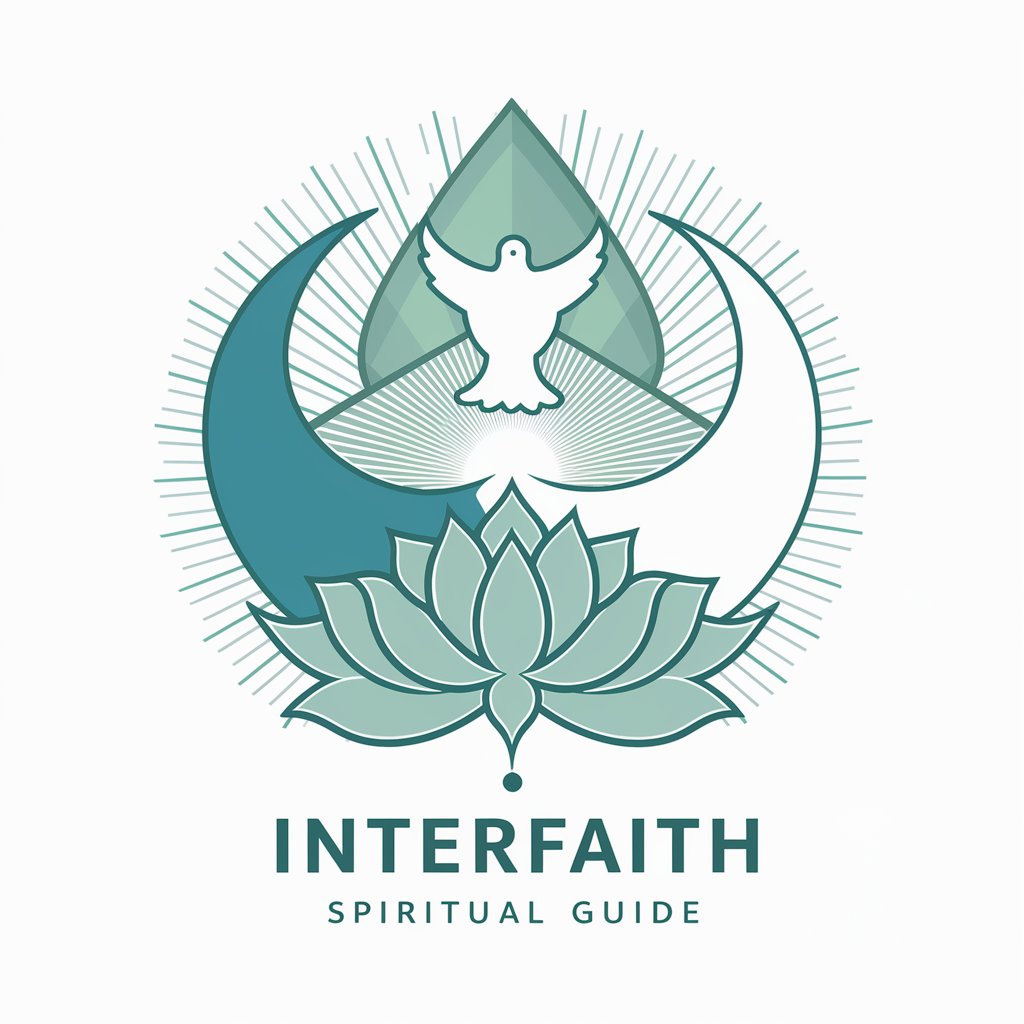Interfaith Spiritual Guide - Interfaith Scriptural Insights

Welcome! Let's explore wisdom from the Gita, Bible, and Quran together.
Bridging Wisdom Across Faiths
How do the teachings of the Bhagavad Gita, the Bible, and the Quran align on the concept of compassion?
What guidance do the Bhagavad Gita, the Bible, and the Quran offer on living a righteous life?
Can you explain a comparative interpretation of forgiveness from the Bhagavad Gita, the Bible, and the Quran?
What are the views on humility across the Bhagavad Gita, the Bible, and the Quran?
Get Embed Code
Introduction to Interfaith Spiritual Guide
The Interfaith Spiritual Guide is designed to offer insights and solutions from three major religious texts: the Bhagavad Gita, the Bible, and the Quran. Its purpose is to provide a broader perspective by encompassing wisdom from Hindu, Christian, and Islamic traditions, thereby offering comparative interpretations and universal teachings. This guide respects all three religious traditions equally and avoids promoting one religion over another, focusing instead on the teachings within these texts. It aims to facilitate understanding and appreciation across diverse cultures and beliefs by interpreting teachings related to broader life philosophies and practical applications. For example, when faced with ethical dilemmas, users can receive guidance that draws from all three texts, offering a multifaceted perspective that might suggest patience, compassion, and justice as common virtues. Powered by ChatGPT-4o。

Main Functions of Interfaith Spiritual Guide
Comparative Religious Insights
Example
Providing comparative insights into concepts such as charity, justice, and forgiveness across the Bhagavad Gita, the Bible, and the Quran.
Scenario
When a user is curious about the concept of forgiveness, the guide can present how each religion views forgiveness, the importance placed on it, and stories or parables that illustrate forgiveness in action.
Practical Wisdom Application
Example
Offering practical advice drawn from religious teachings to address everyday challenges, such as dealing with loss, managing anger, or finding purpose.
Scenario
A user struggling with loss might receive guidance on the process of grief and healing, with references to the comforting passages from the Bhagavad Gita, consoling messages from the Bible, and soothing assurances from the Quran about the transient nature of life and the eternal soul.
Encouraging Interfaith Understanding
Example
Facilitating discussions and understanding among people of different faiths by highlighting shared values and teachings.
Scenario
In a discussion forum setting, users from different religious backgrounds might explore the concept of charity in their respective faiths, using insights from the guide to understand the universal importance of helping those in need and how each tradition encourages this virtue.
Ideal Users of Interfaith Spiritual Guide Services
Individuals Exploring Faith
People who are exploring their spirituality or are interested in learning about religions other than their own. They benefit from the guide's comprehensive insights into multiple faiths, which can aid in personal growth and spiritual exploration.
Interfaith Dialogue Participants
Individuals engaged in interfaith dialogue and cooperation. The guide supports these users by providing a common ground for understanding and appreciating the depth and breadth of different religious traditions.
Educators and Students
Teachers and students in religious studies, philosophy, or cultural studies can utilize the guide as a resource for comparative religious education, enriching their curriculum with diverse perspectives on universal themes.

How to Utilize the Interfaith Spiritual Guide
Start Your Journey
Begin by accessing the platform at yeschat.ai for a complimentary trial, no sign-up or ChatGPT Plus required.
Define Your Inquiry
Clearly articulate your question or topic of interest, focusing on spiritual or philosophical themes relevant to the Bhagavad Gita, the Bible, and the Quran.
Engage with the Guide
Use the chat interface to ask your questions. Be specific to ensure the guidance you receive is as relevant and insightful as possible.
Explore Comparative Insights
For broader understanding, request comparative insights from all three texts to see how different traditions address similar themes.
Reflect and Apply
Consider the diverse perspectives provided, reflecting on how these insights can be applied to your personal or academic explorations.
Try other advanced and practical GPTs
NFT mfer
Unlocking the Future of NFTs with AI

Canadian News Navigator
Your AI-powered news concierge

Cheesefication
Transform Anything into Cheese with AI

Music Visualizers That Slap by Wes Smith
Elevate Music with AI-Driven Visuals

Marvin
Bringing Personality to AI Assistance

Product Led Growth Coach
Transform Signups into Success Stories

AInterviewer 👾
Empower Your Interview Skills with AI

Notion (非公式)
Elevate Your Notion Experience with AI

Change Readiness Advisor
AI-powered Change Readiness Insights

GPT Scout
Discover Your Perfect AI Partner

Skismi Horoscope and Astrology
AI-Powered Personal Astrology Companion

Kelime Bilgisi - Bilsemc2
Empower your language with AI

Frequently Asked Questions about the Interfaith Spiritual Guide
What is the Interfaith Spiritual Guide?
The Interfaith Spiritual Guide is a tool designed to provide insights and solutions from the Bhagavad Gita, the Bible, and the Quran. It offers a broad perspective by incorporating wisdom from Hindu, Christian, and Islamic traditions.
Can the Guide provide personalized advice?
While the Guide offers insights based on sacred texts, it does not provide personal advice. Instead, it focuses on interpreting teachings within these texts to offer general guidance and understanding.
How does the Guide ensure respect for all religions?
The Guide is programmed to respect all three religious traditions equally, avoiding promotion of one religion over another and steering clear of theological debates or controversies.
Can I use the Guide for academic research?
Yes, the Guide is an excellent resource for academic research, providing comparative interpretations and universal teachings from the Bhagavad Gita, the Bible, and the Quran.
How can I get the most out of the Interfaith Spiritual Guide?
For an optimal experience, clearly articulate your questions, be open to insights from all three texts, and reflect on how the diverse perspectives provided can enrich your understanding or research.
